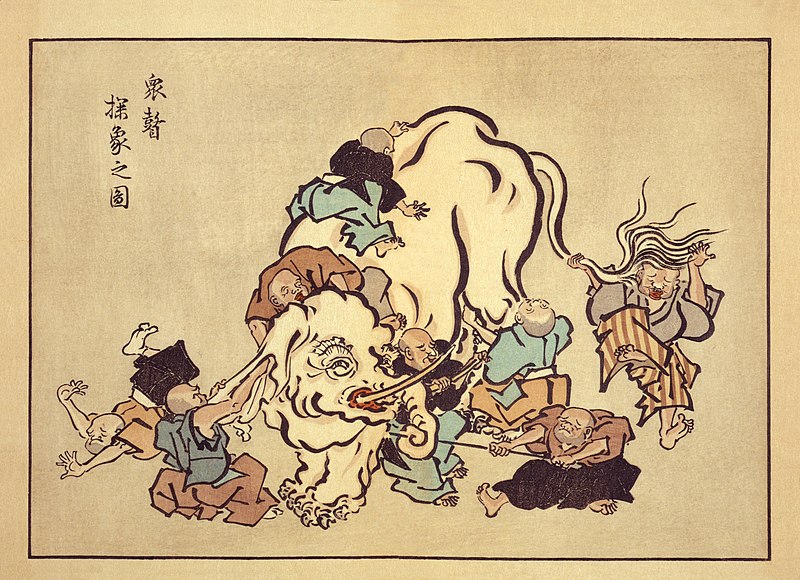
The snake handler on the right – “Stumpy?” – is arguably taking Mark 16:18 “out of context…”
* * * *
I just went back over some posts from last year around this time. I found this post, still in draft form. So for the past couple days I’ve been updating it to this final form.
 Also last year at this time I did WHY we’re getting “less Christian.”
Also last year at this time I did WHY we’re getting “less Christian.”
Posted on May 23, it included the ironic image at right. Then there was The wisdom of Virgil – and an “Angel,” posted on June 2, 2015.
So this post will review those two from last year, plus the original On snake-handling, Fundamentalism and suicide – Part I and Part II.
Part I noted that a small group of rural Christians practice “snake handling” as part of their religion. And that they do that based on a passage from Mark 16:16-18, part of Jesus’ “Great Commission:”
And [Jesus] said to them, “Go into all the world and proclaim the gospel to the whole creation… And these signs will accompany those who believe: in my name they will cast out demons; they will speak in new tongues; they will pick up serpents with their hands; and if they drink any deadly poison, it will not hurt them; they will lay their hands on the sick, and they will recover.” (E.A.)
On the other hand there was an article, Snake-Handling Pentecostal Pastor Dies From Snake Bite. (Which arguably showed that “such a practice may not be such a good idea.”)
Then came the meat of the post, that the Bible is both “simple” and “deep:”
In other words, you could say that the Bible message is both simple enough for a child to understand, yet so full of subtle mysteries that a lifetime can be spent on its study, yet still leave myriads of lessons yet to be learned. (See 1st Corinthians 4:1: “This then is how you should regard us, as servants of Christ and stewards of the mysteries of God.”)
Part II went on to discuss what many say is the proper way to read, study and interpret the Bible. It also discussed both the topics of “Biblical inerrancy” and Fundamentalism.
I said the business of “requiring every word of the Bible to be inerrant” reminded me of what Jesus said in Matthew 23:4. He was talking about the Pharisees of His time, and noted that they tended to “make strict rules that are hard for people to obey. They try to force others to obey all their rules. But they themselves will not try to follow any of those rules.”
Which brings us to WHY we’re getting “less Christian.” That post noted a study: Americans Less Religious Than Ever Before. The gist of the article was that a then-recent poll found Christianity is on the decline, especially among the young. And here are some of the reasons:
Among young non-Christians, nine out of the top 12 perceptions were negative. Common negative perceptions include that present-day Christianity is judgmental (87%), hypocritical (85%), old-fashioned (78%), and too involved in politics (75%) – representing large proportions of young outsiders who attach these negative labels to Christians. (E.A.)
 And finally, note The wisdom of Virgil – and an “Angel.” That post led off with the fable of the Blind men and the elephant.
And finally, note The wisdom of Virgil – and an “Angel.” That post led off with the fable of the Blind men and the elephant.
The moral of that story? That each man ended up with a good idea of part of the elephant. But each went on to “err greatly” – as Jesus might say – by mistakenly assuming that his view was the only accurate picture of the whole elephant.
(Or as Wikipedia said, “the parable implies that one’s subjective experience can be true, but that such experience is inherently limited by its failure to account for other truths or a totality of truth.”)
That in turn brought up Virgil, and his views. That is, throughout history most people have seen religion “in terms of black or white: ‘our attitude toward the possibility of divine control of things tends to be all or nothing.'” But Virgil’s view seemed more practical.
His view was that – despite our best efforts – some of what happens to us may make some sense. But then again “some of what happens seems to make pretty much no sense:”
There is, in other words, an overarching order at work in the world, a final coherence in the way that things work. But it remains out of human reach, and despite our efforts, we can merely come to know it only in part…
Which could be just another way of saying that when you become a Christian, God doesn’t become your personal servant, willing and able to cater to your every whim. Or as one Christian mystic once said, “It is to vigor rather than comfort that you are called.”
Or here’s another way to put it. (In case I’m being too subtle.) In plain words, God doesn’t owe you a thing. (See Luke 17, verses 7-10.) In still further words:
…way too many people think that getting good stuff from God – The Force that Created the Universe– is somehow easier than trying to shoot the head off a match stick…
Which means there are a some important lessons for our spiritual quest. One is that we shouldn’t expect God to cater to our every whim, like some glorified butler. (Maybe we should learn to say, “It’s hard as hell, but now and then I’ll do it just right…”) And maybe we should start worshiping – not to get anything – but rather “asking nothing but to enjoy God’s presence.”
All of which could lead to a far more accurate picture of that “elephant as a whole…”
* * * *

The parable of the “Blind men and the elephant…”
* * * *
The upper image was featured in On snake-handling, Fundamentalism and suicide – Part I.
For some background on the “redux” part of the title, see On “Job the not patient” – REDUX. It’s an allusion to the 1971 book by John Updike, Rabbit Redux. That book-title in turn “led to a redux in popularity of the word redux.” So much so that in a later book, Rabbit At Rest, Updike had his hero – Harry Angstrom – say he “hates that word, you see it everywhere, and he doesn’t know how to pronounce it. Like arbitrageur and perestroika…”
Re: Draft form. See also Writing Rough Draft of Research Paper – Duke of Definition.
Re: “vigor rather than comfort.” The quote is an allusion to the book Practical Mysticism, by Evelyn Underhill, as discussed in On the Nativity of John the Baptist:
Hearing now and again the mysterious piping of the Shepherd, you realize your own perpetual forward movement . . . and so are able to handle life with a surer hand. Do not suppose from this that your new career is to be perpetually supported by agreeable spiritual contacts, or occupy itself in the mild contemplation of the great world through which you move. True, it is said of the Shepherd that he carries the lambs in his bosom; but the sheep are expected to walk, and to put up with the bunts and blunders of the flock. It is to vigor rather than comfort that you are called. (E.A.)
Ariel Press (1914), at page 177. See also Evelyn Underhill – Wikipedia.
The lower image is courtesy of Wikipedia. The caption: “Blind monks examining an elephant, an ukiyo-e print byHanabusa Itchō (1652–1724).” (See also Stay tuned, for future reference.)
* * * *
Here’s I how I put in my new book, “On Mystic Christians.” On those snake handlers, and the need to be consistent in Bible study. For example, Bible Literalists interpret most of the Bible literally, but not – in one glaring example – “The Bible’s erotic love song.” (Aka Song of Solomon.)
Why don’t Bible Literalists interpret “Songs of Songs” literally? Why don’t they adhere to the “exact letter or the literal sense” for this book, like all the others in the Bible?
Some Fundamentalists become snake handlers based on a too-literal interpretation of Mark 16:18: “They will pick up snakes with their hands.” But I would say: “Be consistent. If you’re going to interpret Mark 16:18 that literally, you should do the same with Song of Solomon 7:1-3: ‘Your rounded thighs are like jewels… Your two breasts are like two fawns…’”
But here’s another answer, from Isaac Asimov: “Because of the erotic nature of the book, it has been customary to find allegorical values in it that would make it more than a description of bodily passion:”
Jews would have it speak of the love between Yahveh and Israel; Catholics of the love between Christ and the Church; Protestants of the love between God and man’s soul. However, if we simply accept the words as they stand, the book is a human love poem and a very beautiful one.
* * * *